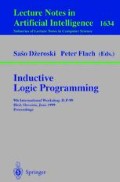Abstract
In this paper we examine the problem of repairing incomplete background knowledge using Theory Recovery. Repeat Learning under ILP considers the problem of updating background knowledge in order to progressively increase the performance of an ILP algorithm as it tackles a sequence of related learning problems. Theory recovery is suggested as a suitable mechanism. A bound is derived for the performance of theory recovery in terms of the information content of the missing predicate definitions. Experiments are described that use the logical back-propagation ability of Progol 5.0 to perform theory recovery. The experimental results are consistent with the derived bound.
Access this chapter
Tax calculation will be finalised at checkout
Purchases are for personal use only
Preview
Unable to display preview. Download preview PDF.
References
K. M. Khan, S. H. Muggleton, and R. D. G. Parson. Repeat learning using predicate invention. In David Page, editor, Proceedings of the Eighth International Conference on Inductive Logic Programming, volume 1446 of LNAI, pages 165–174, Madison, Wisconsin, USA, 1998. Springer.
S. Moyle and S. H. Muggleton. Learning programs in the event calculus. In Nada Lavrač and Sašo Džeroski, editors, Proceedings of the Seventh International Conference on Inductive Logic Programming, volume 1297 of LNAI, pages 205–212, Prague, Czech Republic, September 1997. Springer.
S. H. Muggleton. Inverse entailment and progol. New Generation Computing, 13:245–286, 1995.
S. H. Muggleton. Learning from positive data. In Proceedings of the Sixth Workshop on Inductive Logic Programming, Stockholm, 1996.
S. H. Muggleton and C. D. Page. A learnability model for universal representations. Technical report, Oxford University Computing Laboratory, Oxford, UK, 1997.
S. H. Muggleton and L. De Raedt. Inductive logic programming: theory and methods. Journal of Logic Programming, 19,20:629–679, 1994.
M. E. Stickel. A prolog technology theorem prover: a new exposition and implementation in prolo. Theoretical Computer Science, 104(1):109–128, 1992.
D. Welsh. Codes and Cryptography. Oxford Science Publications. Oxford University Press, 1989.
Author information
Authors and Affiliations
Editor information
Editors and Affiliations
Rights and permissions
Copyright information
© 1999 Springer-Verlag Berlin Heidelberg
About this paper
Cite this paper
Parson, R., Khan, K., Muggleton, S. (1999). Theory Recovery. In: Džeroski, S., Flach, P. (eds) Inductive Logic Programming. ILP 1999. Lecture Notes in Computer Science(), vol 1634. Springer, Berlin, Heidelberg. https://doi.org/10.1007/3-540-48751-4_24
Download citation
DOI: https://doi.org/10.1007/3-540-48751-4_24
Published:
Publisher Name: Springer, Berlin, Heidelberg
Print ISBN: 978-3-540-66109-2
Online ISBN: 978-3-540-48751-7
eBook Packages: Springer Book Archive

